|
|
|
Sort Order |
|
|
|
Items / Page
|
|
|
|
|
|
|
| Srl | Item |
| 1 |
ID:
142796
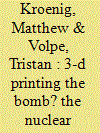

|
|
|
|
|
| Summary/Abstract |
3-D printing will make it easier for countries to acquire nuclear weapons, providing a way to print pieces of the nuclear jigsaw puzzle indigenously before anyone notices. The United States should lead an international effort to prevent this avenue to a cascade of nuclear weapons proliferation before it is too late.
|
|
|
|
|
|
|
|
|
|
|
|
|
|
|
|
| 2 |
ID:
192573
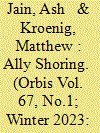

|
|
|
| 3 |
ID:
152577
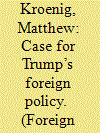

|
|
|
|
|
| Summary/Abstract |
Media coverage of U.S. President Donald Trump’s foreign policy has been overwhelmingly negative. Analysts have seized on early policy missteps, a supposed slowness in staffing the national security bureaucracy, and controversial statements and actions as evidence that Trump’s foreign policy is already failing.
|
|
|
|
|
|
|
|
|
|
|
|
|
|
|
|
| 4 |
ID:
090838
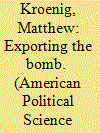

|
|
|
|
|
| Publication |
2009.
|
| Summary/Abstract |
Why do states provide sensitive nuclear assistance to nonnuclear weapon states, contributing to the international spread of nuclear weapons? Using a new data set on sensitive nuclear transfers, this article analyzes the determinants of sensitive nuclear assistance. I first describe a simple logic of the differential effects of nuclear proliferation, which I use to generate hypotheses about the conditions under which states provide sensitive nuclear assistance. I then show that the strategic characteristics of the potential nuclear suppliers are the most important determinants of sensitive nuclear assistance. Explanations that emphasize the importance of economic motivations do not find support in the data. This article presents a new approach to the study of the spread of nuclear weapons, focusing on the supply side of nuclear proliferation.
|
|
|
|
|
|
|
|
|
|
|
|
|
|
|
|
| 5 |
ID:
138790
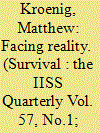

|
|
|
|
|
| Summary/Abstract |
Russia’s annexation of Crimea, invasion of Donbas, and continued threats to Ukraine and other European countries not only menace the stability of the post-Cold War order in Europe, but also pose a fundamental challenge to the assumptions about the strategic environment that have undergirded the NATO alliance for the past quarter of a century.
|
|
|
|
|
|
|
|
|
|
|
|
|
|
|
|
| 6 |
ID:
130263
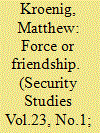

|
|
|
|
|
| Publication |
2014.
|
| Summary/Abstract |
Why do great powers take such different approaches to the issue of nuclear proliferation? Why do states oppose nuclear proliferation more vigorously in some cases than in others? In short, what explains great power nonproliferation policy? To answer these questions, this article tests two competing theories of nonproliferation policy. The first, political relationship theory, suggests that states oppose nuclear proliferation to their enemies but are less concerned when friends acquire nuclear weapons. The second, power-projection theory, argues that states oppose the spread of nuclear weapons to states over which they have the ability to project military power because nuclear proliferation in those situations would constrain their military freedom of action. In contrast, states will be less likely to resist, and more likely to promote, nuclear proliferation to states against which they cannot use force. To test these hypotheses, this article uses evidence from great power nonproliferation policy from 1945 to 2000. While both theories find some support, the power-projection theory performs significantly better. The findings of this article have important implications for international relations theory and US nonproliferation policy.
|
|
|
|
|
|
|
|
|
|
|
|
|
|
|
|
| 7 |
ID:
137244
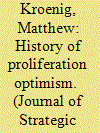

|
|
|
|
|
| Summary/Abstract |
Students of international politics known as ‘proliferation optimists’ argue that when it comes to the spread of nuclear weapons ‘more may be better’ because nuclear weapons deter great power war and produce greater levels of international stability. This essay provides a critique of proliferation optimism, challenging optimism’s conception of nuclear deterrence theory, its logical underpinnings, and its policy recommendations. It does this by conducting an intellectual history of proliferation optimism, identifying the core weaknesses of proliferation optimism as a theoretical framework, and articulating the myriad threats posed by nuclear proliferation.
|
|
|
|
|
|
|
|
|
|
|
|
|
|
|
|
| 8 |
ID:
113118
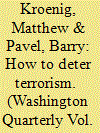

|
|
|
| 9 |
ID:
131236
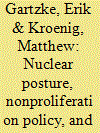

|
|
|
|
|
| Publication |
2014.
|
| Summary/Abstract |
What is the relationship between nuclear postures and nonproliferation policies and the spread of nuclear weapons? At first blush, this might appear to be an obvious question. After all, states go to great lengths-extending nuclear security guarantees to nonnuclear weapon states, forward-deploying nuclear weapons on the territory of allies, sizing their own nuclear arsenals with the proliferation decisions of other states in mind, supporting international institutions in conducting inspections of nuclear facilities in nonnuclear weapon states, restricting the availability of sensitive nuclear technology, applying and enforcing sanctions against would-be proliferators, conducting military strikes against nuclear facilities, and promoting nuclear cooperation for peaceful purposes, among many other steps-to prevent the spread of nuclear weapons. It would be strange to imagine that states pursue such actions unless they can expect a policy payoff in terms of peace or security. Yet, there is little systematic evidence to suggest that nuclear postures and policies have a meaningful impact on the spread of nuclear weapons.
|
|
|
|
|
|
|
|
|
|
|
|
|
|
|
|
| 10 |
ID:
117996
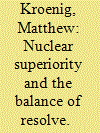

|
|
|
|
|
| Publication |
2013.
|
| Summary/Abstract |
Scholars have long debated whether nuclear superiority or the balance of resolve shapes the probability of victory in nuclear crises, but they have not clearly articulated a mechanism linking superiority to victory, nor have they systematically analyzed the entire universe of empirical cases. Beginning from a nuclear brinkmanship theory framework, I develop a new theory of nuclear crisis outcomes, which links nuclear superiority to victory in nuclear crises precisely through its effect on the balance of resolve. Using a new data set on fifty-two nuclear crisis dyads, I show that states that enjoy nuclear superiority over their opponents are more likely to win nuclear crises. I also find some support for the idea that political stakes shape crisis outcomes. These findings hold even after controlling for conventional military capabilities and for selection into nuclear crises. This article presents a new theoretical explanation, and the first comprehensive empirical examination, of nuclear crisis outcomes.
|
|
|
|
|
|
|
|
|
|
|
|
|
|
|
|
| 11 |
ID:
180547
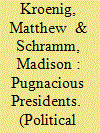

|
|
|
|
|
| Summary/Abstract |
MATTHEW KROENIG and MADISON SCHRAMM analyze how domestic political institutions affect international conflict. Using standard international relations datasets on conflict, they demonstrate that jointly-presidential democratic dyads are over two times more likely to become involved in militarized interstate disputes than other jointly-democratic dyads. They also find that when it comes to lower-level conflicts, jointly-presidential dyads are statistically indistinguishable from nondemocratic dyads. They argue that the results have important implications for our understanding of democratic peace theory and the causes of international conflict.
|
|
|
|
|
|
|
|
|
|
|
|
|
|
|
|
| 12 |
ID:
148450
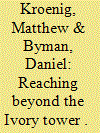

|
|
|
|
|
| Summary/Abstract |
Many scholars are drawn to political science research with hopes that their ideas will influence important policy debates. Unfortunately, scholars who want to shape policy often do not design research appropriately or take advantage of available conditions and opportunities to advance their ideas. This article identifies the conditions under which ideas of academics—and nongovernment knowledge in general—are more likely to be considered by and influence those in the policy world. To reach beyond the ivory tower, we argue that scholars should design research that might produce actionable findings and recommendations, identify moments of ripeness in policy debates, and inject their ideas into the policy process. For those who want to conduct rigorous academic scholarship and influence real-world debates, we provide the strongest possible encouragement and hope that our advice proves helpful.
|
|
|
|
|
|
|
|
|
|
|
|
|
|
|
|
| 13 |
ID:
150112
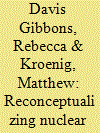

|
|
|
|
|
| Summary/Abstract |
According to a widespread conventional wisdom in the scholarly literature, the threat of nuclear weapons resides largely in the risk of accident, inadvertent use, and nuclear terrorism. In this article, we argue that this conventional wisdom is inconsistent with the increasing danger of nuclear use by leaders intentionally employing nuclear weapons as tools of statecraft. This article identifies the theoretical processes that could give rise to deliberate nuclear use. Next, it marshals empirical evidence through an examination of developments in several salient geopolitical rivalries between nuclear-armed actors in the world today, demonstrating that deliberate nuclear use may be becoming increasingly likely. Finally, it offers concluding remarks regarding the steps world leaders can take to deter and prevent intentional nuclear strikes. This article seeks to bring back in an appreciation of deliberate nuclear use to academic studies of nuclear deterrence and instructs policymakers on the appropriate understanding of the risks of nuclear weapons proliferation.
|
|
|
|
|
|
|
|
|
|
|
|
|
|
|
|
| 14 |
ID:
158522
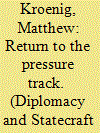

|
|
|
|
|
| Summary/Abstract |
During the 2016 United States presidential election campaign, Donald Trump promised to “renegotiate” the July 2015 Joint Comprehensive Plan of Action, better known as the Iran nuclear deal. The deal does not prevent Iran from building nuclear weapons and in some ways actually makes it easier for Iran to go nuclear in the future. The mere continuation of the current deal could undermine America’s interests in the Middle East and its global non-proliferation policy. How then can the Donald Trump Administration work to renegotiate the deal? This analysis provides a strategy that the Trump Administration can follow to improve American policy toward Iran, namely do what Iran is doing to the United States: abide by the strict terms of the agreement, whilst competing in all of the ways not covered in the deal. From an American perspective, increasing pressure on Tehran will constrain Iran’s destabilising influence in the region. Over time, Washington can leverage the pressure to force Iran back to the table to strike a renegotiated agreement that eliminates, not just delays, the Iranian nuclear and missile threat.
|
|
|
|
|
|
|
|
|
|
|
|
|
|
|
|
| 15 |
ID:
087443
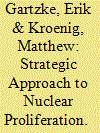

|
|
|
|
|
| Publication |
2009.
|
| Summary/Abstract |
Nuclear weapons have occupied a central role in international politics ever since
their introduction onto the world stage in 1945. The use of nuclear weapons by
the United States on Hiroshima and Nagasaki is widely believed to have compelled
Japanese surrender and brought World War II to a close. The vast nuclear arsenals of
the United States and the Soviet Union were fundamental to the bipolar, strategic
relationship that structured international politics for more than fifty years during the
Cold War. And while many analysts had hoped that the collapse of the Soviet Union
would lead to a reduction in the influence of nuclear weapons in international affairs,
it was not to be so. The threat of nuclear proliferation resurfaced as India, Pakistan,
and more recently, North Korea have conducted nuclear tests. Other regional powers,
including Iran, Iraq, and Libya, are pursuing or have pursued nuclear capabilities.
The terrorist attacks against the United States on September 11, 2001, demonstrated
that if terrorists, intent on carrying out mass-casualty attacks, acquired nuclear
weapons, the results could be catastrophic. The ease with which states or terrorists
could potentially acquire sensitive nuclear materials was exemplified by the black
market nuclear proliferation ring operated by Pakistani scientist A. Q. Khan. Indeed,
in his 2007 annual report to Congress on the projected threats to the national security
of the United States of America, Director of National Intelligence J. Michael
McConnell concluded that nuclear proliferation poses one of the greatest threats to
U.S. national security.1
|
|
|
|
|
|
|
|
|
|
|
|
|
|
|
|
| 16 |
ID:
101730
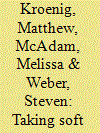

|
|
|
|
|
| Publication |
2010.
|
| Summary/Abstract |
The term soft power is entrenched in the theory and practice of American foreign policy, yet scholars have not yet developed, or empirically tested, a theory about the conditions under which governments can use soft power to their advantage-and that makes good policy hard to design. Drawing on research from the fields of communications, social psychology, and international relations theory, we develop a theory about the conditions under which state efforts to employ soft power will be most likely to succeed. We argue that to apply soft power effectively states must communicate to an intended target in a functioning marketplace of ideas, persuade the target to change its attitude on a relevant political issue, and ensure that the target's newly held attitude influences international political outcomes. We probe the plausibility of our theoretical claims through an examination of U.S. attempts to use soft power in the Iraq War, the war on terror, and democracy promotion. In conclusion, we set forth an agenda for future research on soft power and provide insights for policymakers interested in using soft power as a tool of foreign policy.
|
|
|
|
|
|
|
|
|
|
|
|
|
|
|
|
| 17 |
ID:
108944
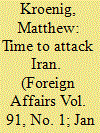

|
|
|
| 18 |
ID:
144082
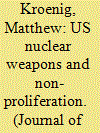

|
|
|
|
|
| Summary/Abstract |
According to a widespread conventional wisdom, there is a link between US nuclear weapons and nuclear proliferation and, therefore, in order to prevent the spread of nuclear weapons to other states, the US government must first make changes to its own nuclear arsenal. This article challenges the notion that US nuclear posture has a significant bearing on the proliferation and non-proliferation behavior of other states. Contrary to the received wisdom in policy circles, this article maintains that state decisions on nuclear non-proliferation issues are driven by a range of other security, economic, and political factors and, once these considerations are taken into account, there is little if any remaining variance to be explained by US nuclear posture. Using a dataset on US nuclear arsenal size from 1945 to 2011, this article examines the relationship between the size of the US nuclear arsenal and a variety of nuclear non-proliferation outcomes. It finds that there is no evidence of a relationship between the size of the US arsenal and: the exploration, pursuit, or acquisition of nuclear weapons by other states; the provision of sensitive nuclear assistance to non-nuclear weapon states; and voting on non-proliferation issues in the United Nations Security Council. The results are robust to alternate conceptualizations and measurements of US nuclear weapons and in various subsamples of data. This article breaks new ground on an empirical research agenda on how the nuclear policies and postures of the major nuclear powers affect the spread of nuclear weapons and has important implications for nuclear security policy.
|
|
|
|
|
|
|
|
|
|
|
|
|
|
|
|
| 19 |
ID:
076990
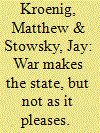

|
|
|
|
|
| Publication |
2006.
|
| Summary/Abstract |
The shock of war is thought to be closely associated with the growth of the state, in the United States and elsewhere. Yet each proposal to significantly expand state power in the United States since September 11 has been resisted, restrained, or even rejected outright. This outcome - theoretically unexpected and contrary to conventional wisdom - is the result of enduring aspects of America's domestic political structure: the separation of powers at the federal level between three co-equal and overlapping branches, the relative ease with which interest groups access the policy-making process, and the intensity with which executive-branch bureaucracies guard their organizational turf. These persistent aspects of u.s. political life, designed by the nation's founders to impede the concentration of state power, have substantially shaped the means by which contemporary guardians of the American state pursue "homeland security." War does make the state, but not as it pleases. Theoretical approaches to state building should recognize that domestic political institutions mediate between the international shock of war and domestic state building
|
|
|
|
|
|
|
|
|
|
|
|
|
|
|
|
| 20 |
ID:
182012
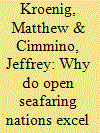

|
|
|
|
|
|
|
|